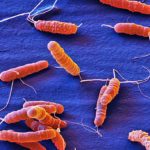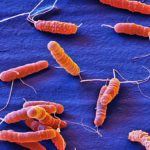Link to Pubmed [PMID] – 24447914
Int. J. Med. Microbiol. 2014 May;304(3-4):314-20
Helicobacter pylori colonizes half of the world population and is associated with gastric cancer. We have previously demonstrated that docosahexaenoic acid (DHA), an n-3 polyunsaturated fatty acid known for its anti-inflammatory and antitumor effects, directly inhibits H. pylori growth in vitro and in mice. Nevertheless, the concentration of DHA shown to reduce H. pylori mice gastric colonization was ineffective in vitro. Related to the auxotrophy of H. pylori for cholesterol, we hypothesize that other mechanisms, in addition to DHA direct antibacterial effect, must be responsible for the reduction of the infection burden. In the present study we investigated if DHA affects also H. pylori growth, by reducing the availability of membrane cholesterol in the epithelial cell for H. pylori uptake. Levels of cholesterol in gastric epithelial cells and of cholesteryl glucosides in H. pylori were determined by thin layer chromatography and gas chromatography. The consequences of epithelial cells’ cholesterol depletion on H. pylori growth were assessed in liquid cultures. We show that H. pylori uptakes cholesterol from epithelial cells. In addition, DHA lowers cholesterol levels in epithelial cells, decreases its de novo synthesis, leading to a lower synthesis of cholesteryl glucosides by H. pylori. A previous exposition of H. pylori to cholesterol influences the bacterium response to the direct inhibitory effect of DHA. Overall, our results suggest that a direct effect of DHA on H. pylori survival is modulated by its access to epithelial cell cholesterol, supporting the notion that cholesterol enhances the resistance of H. pylori. The cholesterol-dependent resistance of H. pylori to antimicrobial compounds raises new important aspects for the development of new anti-bacterial strategies.


